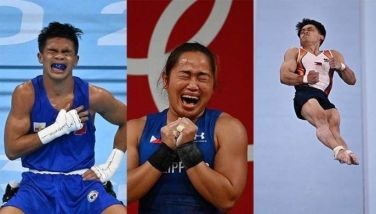Chinese regulators to study RP experience in bank rehab
July 6, 2005 | 12:00am
Bank regulators from China are expected to arrive in the country to study the Philippine experience in bank rehabilitation, the disposition of bad assets of banks and the establishment of special purpose vehicles.
Officials from the China Banking Regulatory Commission (CBRC) will send a team to the Philippines on July 15 to meet with the Bangko Sentral ng Pilipinas (BSP) as well as leaders of the Philippine banking industry.
The Bankers Association of the Philippines (BAP) said they will meet with the Chinese officials who wanted to learn from the country’s experience in dealing with problematic bank assets and bad loans.
BAP executive director Leonilo Coronel told reporters that Chinese officials are interested in how the Philippines handled the post-Asian Crisis fall-out where Philippine banks accumulated significant amounts of bad loans and bad assets particularly as a result of the collapse in the property industry.
According to Coronel, Chinese officials are particularly interested in the on-going attempt to ease the bad assets burden of the banking sector since the country has been attempting to do it with minimum cash outlay from the government.
"There are other successful efforts to rehabilitate the banking industry in other countries but ours is interesting to them because the government did not shell-out massive public funds to finance it," Coronel said.
Since the Philippine government did not have the resources to actually bail out troubled banks, the BSP had resorted to mobilizing investment funds from the private sector, specifically companies that specialize in taking over bad assets and turning them around for profit.
The legislation of the Special Purpose Vehicles Act (SPVA) allowed the entry of foreign investors into the country for the purpose of acquiring bad assets and bad loans from local financial institutions.
These SPVs acquire the assets at a discount and then use their expertise and capital to turn them around through restructuring and careful asset management.
In exchange, the government offered various incentives such as tax perks and selective easing of accounting procedures to allow the financial institutions to stagger the booking of the losses arising from the discounted sale of their bad assets.
To date, the BSP reported that banks have unloaded over P100 billion worth of bad assets and bad loans under the SPVA and the transactions that have actually qualified for incentives now amount to over P55 billion.
"Some of these transactions might not qualify for incentives so the actual number might be lower than P104 billion but we are confident that it would be over P100 billion," said BSP deputy governor Nestor Espenilla Jr. said.
Espenilla said the P104-billion total already included the P11.9 billion worth of non-performing loans sold by the United Coconut Planters Bank (UCPB) which officially signed off the entire portfolio in February.
The BSP admitted early on that it was powerless to actually compel banks to take the haircut and unload their bad assets at a loss, but regulators still decided to assign higher risk-weighting on bad loans and bad assets to force banks to unload.
The carrot-and-stick approach, according to Espenilla, compelled banks to take more aggressive steps to reduce their NPL levels or incur more costs in supporting their NPLs.
Officials from the China Banking Regulatory Commission (CBRC) will send a team to the Philippines on July 15 to meet with the Bangko Sentral ng Pilipinas (BSP) as well as leaders of the Philippine banking industry.
The Bankers Association of the Philippines (BAP) said they will meet with the Chinese officials who wanted to learn from the country’s experience in dealing with problematic bank assets and bad loans.
BAP executive director Leonilo Coronel told reporters that Chinese officials are interested in how the Philippines handled the post-Asian Crisis fall-out where Philippine banks accumulated significant amounts of bad loans and bad assets particularly as a result of the collapse in the property industry.
According to Coronel, Chinese officials are particularly interested in the on-going attempt to ease the bad assets burden of the banking sector since the country has been attempting to do it with minimum cash outlay from the government.
"There are other successful efforts to rehabilitate the banking industry in other countries but ours is interesting to them because the government did not shell-out massive public funds to finance it," Coronel said.
Since the Philippine government did not have the resources to actually bail out troubled banks, the BSP had resorted to mobilizing investment funds from the private sector, specifically companies that specialize in taking over bad assets and turning them around for profit.
The legislation of the Special Purpose Vehicles Act (SPVA) allowed the entry of foreign investors into the country for the purpose of acquiring bad assets and bad loans from local financial institutions.
These SPVs acquire the assets at a discount and then use their expertise and capital to turn them around through restructuring and careful asset management.
In exchange, the government offered various incentives such as tax perks and selective easing of accounting procedures to allow the financial institutions to stagger the booking of the losses arising from the discounted sale of their bad assets.
To date, the BSP reported that banks have unloaded over P100 billion worth of bad assets and bad loans under the SPVA and the transactions that have actually qualified for incentives now amount to over P55 billion.
"Some of these transactions might not qualify for incentives so the actual number might be lower than P104 billion but we are confident that it would be over P100 billion," said BSP deputy governor Nestor Espenilla Jr. said.
Espenilla said the P104-billion total already included the P11.9 billion worth of non-performing loans sold by the United Coconut Planters Bank (UCPB) which officially signed off the entire portfolio in February.
The BSP admitted early on that it was powerless to actually compel banks to take the haircut and unload their bad assets at a loss, but regulators still decided to assign higher risk-weighting on bad loans and bad assets to force banks to unload.
The carrot-and-stick approach, according to Espenilla, compelled banks to take more aggressive steps to reduce their NPL levels or incur more costs in supporting their NPLs.
BrandSpace Articles
<
>
- Latest
- Trending
Trending
Latest
Trending
Latest
Recommended































